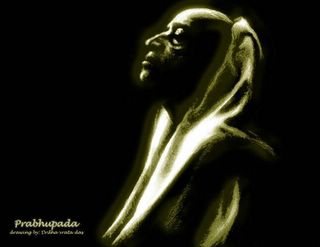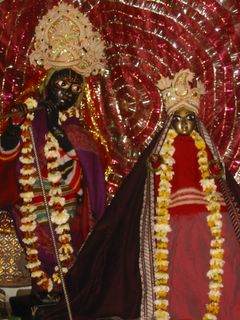"Just as there is life, there is death. Someone or something takes birth, grows, stays for sometime, deteriorates, and then dies. Another name for birth is death. You cannot have one without the other, meaning that when someone is born, someone will soon die (as most species do not live very long); and when someone dies, someone is soon born. Everyone and everything in its normal state wants to live as long as possible – eternally. Eternality, however, is not associated with matter, but is a spiritual affair. Death to matter and to our material bodies is inevitable, but if we master the science of dying before dying, we will connect with that which is eternal – our soul and its home in the spiritual world. After all, death is to remove everything false and secondary."
- Quote from 'The Beggar IV', pg.66, Bhakti Tirta Swami
Friday, June 24, 2005
A devotee's greatest enemy
Devotee: Prabhupada, what is a devotee’s greatest enemy?
Prabhupada: He himself. Because he is a rascal, he is his own greatest enemy. Give up this rascaldom, and you will become your friend. Nobody is your enemy. You are your own enemy.
— Morning walk conversation with Srila Prabhupada in Paris on 12 June 1974.
Quoted from the Sri Krishna Kathamrita Bindu. For more click here.
Prabhupada: He himself. Because he is a rascal, he is his own greatest enemy. Give up this rascaldom, and you will become your friend. Nobody is your enemy. You are your own enemy.
— Morning walk conversation with Srila Prabhupada in Paris on 12 June 1974.
Quoted from the Sri Krishna Kathamrita Bindu. For more click here.
Oh spirit soul
In the year 1874 Srila Bhaktivinoda Thakur published a philosophical book titled Datta Kautubha. Durring the same period of time he composed the following poem Known as Sharagrahi Vaishnava. Below are a few stanzas from that poem.
Alas for those who spend their days
In festive mirth and joy.
The dazzling, deadly, liquid forms
Their hearts fore’er employ.
The shining bottles charm their eyes
And draw their heart’s embrace;
The slaves of wine can never rise
From what we call disgrace.
Was man intended to be
A brute in work and heart?
Should man, the Lord of all around,
From common sense depart?
Man’s life to him a problem dark –
A screen both left and right;
No soul hath come to tell us what
Exists beyond our sight.
Tell me not in reasoning cold,
The soul is made alone
By earth’s mechanic lifeless rules
And to destruction prone.
But then a voice, how deep and soft;
Within ourselves is left;
Man! Man! Thou art immortal soul!
Thee Death can never melt.
O Love! Thy power and spell benign
Now melt my soul to God;
How can my earthly words describe
That feeling soft and broad.
O Sharangrahi Vaishnava soul,
Thou art an angel fair;
Lead, lead me on to Vrindaban
And spirit’s power declare.
There rests my soul from matter free
Upon my Lover’s arms-
Eternal peace and spirits love
Are all my chanting charms.
Alas for those who spend their days
In festive mirth and joy.
The dazzling, deadly, liquid forms
Their hearts fore’er employ.
The shining bottles charm their eyes
And draw their heart’s embrace;
The slaves of wine can never rise
From what we call disgrace.
Was man intended to be
A brute in work and heart?
Should man, the Lord of all around,
From common sense depart?
Man’s life to him a problem dark –
A screen both left and right;
No soul hath come to tell us what
Exists beyond our sight.
Tell me not in reasoning cold,
The soul is made alone
By earth’s mechanic lifeless rules
And to destruction prone.
But then a voice, how deep and soft;
Within ourselves is left;
Man! Man! Thou art immortal soul!
Thee Death can never melt.
O Love! Thy power and spell benign
Now melt my soul to God;
How can my earthly words describe
That feeling soft and broad.
O Sharangrahi Vaishnava soul,
Thou art an angel fair;
Lead, lead me on to Vrindaban
And spirit’s power declare.
There rests my soul from matter free
Upon my Lover’s arms-
Eternal peace and spirits love
Are all my chanting charms.
Thursday, June 23, 2005
Krishna is not hungry
"Krishna is not hungry. Krishna is atmarama. He is self-sufficient. He does not require. He is producing food for us. That’s a fact. We get so many fruits and flower. We don’t manufacture it in the factory; neither it is possible. It is Krishna's manufacture. It is Krishna. Raso ’ham apsu kaunteya... By His action of different energies these things are produced. Why? These things are produced for whom? For Krishna? No. For us... He is maintaining us. So is it not our duty to offer Him first? 'Sir, You have supplied so many nice things. You take first.' This is bhakti."
- Lecture on Srimad-Bhagavatam 1.2.8, Bombay, December 26, 1972 by Srila Prabhupada
- Lecture on Srimad-Bhagavatam 1.2.8, Bombay, December 26, 1972 by Srila Prabhupada
The Vrindavan summer season
This passage is from Srila Kavi-karnapur’s “Ananda Vrndavana Campu”, section entitled- ‘The summer season’.
“Besides beautifying the night, the summer moon brings full satisfaction to all. Due to the intense suffering experienced everyday, the very word ‘daytime’ instills fear in the heart. But everyone appreciates the cool nights of summer. In this way the summer is glorified. Amidst the lotus flowers in the lake there is a houseboat covered with a canopy trimmed with hanging pearls that shake in the wind. It is sprayed by the mist scented with fine particles of camphor, and buffeted by the pleasant winds of camaras waved by loving attendants. Radhika and Krishna sleep in blissful reverie within that charming houseboat.”
“Besides beautifying the night, the summer moon brings full satisfaction to all. Due to the intense suffering experienced everyday, the very word ‘daytime’ instills fear in the heart. But everyone appreciates the cool nights of summer. In this way the summer is glorified. Amidst the lotus flowers in the lake there is a houseboat covered with a canopy trimmed with hanging pearls that shake in the wind. It is sprayed by the mist scented with fine particles of camphor, and buffeted by the pleasant winds of camaras waved by loving attendants. Radhika and Krishna sleep in blissful reverie within that charming houseboat.”
Subscribe to:
Comments (Atom)




